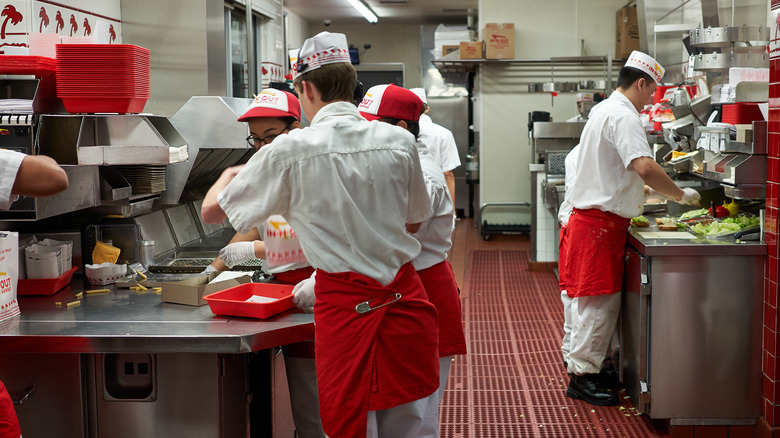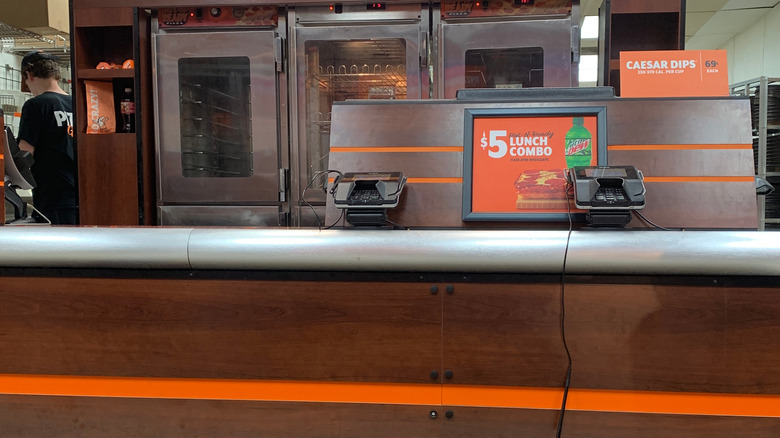What California's Fast Food Bill Could Mean For Workers
It's never a good time to be a fast food worker, but the coronavirus pandemic made what was already a difficult job to begin with even more challenging.
As reported by Insider, a Black Box Intelligence survey found that 62% of the 4,700 restaurant workers surveyed said they had come under "emotional abuse and disrespect" from customers, with nearly half — or about 49% — saying they had gotten the same from their managers. The situation has gotten so bad that one fast food worker, who had been in the industry for more than two decades (six years at McDonald's and 20 at Taco Bell), had decided to quit, telling Insider: "Fast food is pretty much the only thing I've ever known. If customers hadn't become so unreasonable and angry. I probably would've just kept doing what I was doing. I loved my job until Covid hit."
It should come as no surprise then that the country's fast food industry is experiencing a serious staffing shortage, with many so short-handed that dining rooms across the country are closing just to be able to cope.
California's fast food labor bill passes its first hurdle
California state legislators are looking to change things by introducing AB 257, or the Fast Food and Accountability and Standards Recovery Act (aka FAST Act). Per The Counter, the proposed legislation seeks to set up an independent council that "would include five representatives for state agencies that handle labor, health, and workplace safety; two workers and two employee advocates; and one representative each for franchisees and corporations." That group would, in turn, set minimum standards involving core issues like pay and working conditions for the fast food industry. The FAST Act would only apply to fast food chains with 30 or more outlets around the country.
One of the bill's sponsors, Assemblymember Chris Holden, called the bill a win, because it was a chance for the state to change the industry's playing field, As reported by The Associated Press, Holden (who himself was once a fast food franchisee) says that "California has a chance to lead the country and address long-standing issues in the fast food industry by creating a statewide fast food sector council," adding that the bill "is about fairness, and it is about bringing all the responsible parties to the table to collaborate on solutions."
This is the second time the bill has come up for a vote — it failed by just three votes when it was proposed last year (via Forbes).
Fast food operators are unhappy about the bill
The bill has received the support of labor groups, but unsurprisingly it has its opponents, particularly those who sit on the corporate side of the negotiating table. Chief legal and business officer for In-N-Out Burger Arnie Wensigne told ABC10 that the proposed panel took away a restaurant operator's right to negotiate with its workers. "There would be no limit to their authority to set new rules or to overturn the values that have created a high-quality workplace for over seven decades. Taking away our ability to interact with our associates will ultimately damage our long-established relationship of trust and, in turn, diminish the experience of customers," he said.
The California Restaurant Association is also against the bill, saying it is hitting the industry at the wrong time. "As the restaurant community seeks to climb out of the recession, we urge legislators to reject this bill and work instead with leaders in the restaurant community to create policies that help restaurants and their workers, not hurt them."
The bill still has some way to go before it becomes a law. But if it passes, it could become a transformative piece of legislation that could bring some relief to fast food workers, who work in conditions that one Jack in the Box shift leader has described as "borderline slavery."


